

Discover more from Fast Women
Fast Women: Led by Peres Jepchirchir, four break 2:17 in London
Harvard's Victoria Bossong is in the midst of a breakout season.
Issue 289, sponsored by Bombas
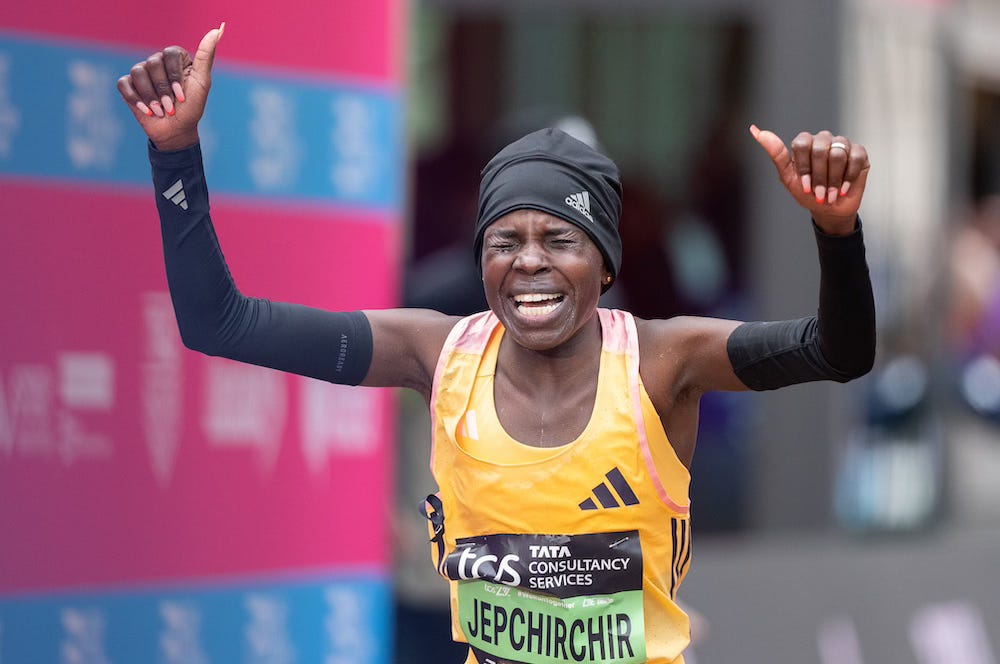
Peres Jepchirchir sets a women’s-only world record in London
When the field for this year’s London Marathon was released, it seemed inevitable that Mary Keitany’s women’s-only world record would fall. Since Keitany ran her 2:17:01 at the 2017 London Marathon, what’s competitive in women’s marathoning has changed considerably, with a big boost from shoe technology. And this year’s race attracted a lot of heavy hitters, including world record holder Tigst Assefa, who ran 2:11:53 in Berlin last fall.
A pack of seven athletes went through halfway in 1:07:04. By 30K, it was down to four: Kenya’s Joyciline Jepkosgei and Peres Jepchirchir, and Ethiopia’s Assefa and Megertu Alemu. With 800m to go, they were still all together. In the end, the race became a 600m sprint, with Jepchirchir closing the best; she screamed with joy as she broke the tape in 2:16:16. Assefa took second (2:16:23), Jepkosgei was third (2:16:24) and Alemu was fourth (2:16:34).
“I thought the race would be fast and that the [women-only] record would go, but I was not expecting it to be me,” Jepchirchir said after the race.
The top four athletes dipped under the previous record. Given how late the race broke apart, it was surprising how much they spread out. I would love to see what Jepchirchir’s last 400m or 600m was.
Great Britain’s top finisher was Mhairi Maclennan, who ran 2:29:15 for 11th in her marathon debut. The top American woman was Melissa Perlman, who ran 2:44:57 and finished seventh in the 40–44 age group.
I’m interested to see how this race impacts Kenya’s Olympic marathon squad. Ruth Chepngetich fell off the lead pack around 20K, and Brigid Kosgei was gone by 25K. Because Athletics Kenya is looking for athletes to eliminate, those are the logical choices.
I’d be shocked if Jepchirchir’s win didn’t earn her a spot on the team, especially because she’s the reigning Olympic champion. And same with Hellen Obiri’s win in Boston. If we assume Chepngetich and Kosgei are out, that leaves the selectors to decide which one is better: Rosemary Wanjiru’s 2:16:14 runner-up performance in Tokyo or Sharon Lokedi’s 2:22:45 runner-up finish in Boston. And the last thing they need is another contender, but Jepkosgei made it clear she should have been at least considered for one of the spots. (Results | Video of the last four minutes of the race)
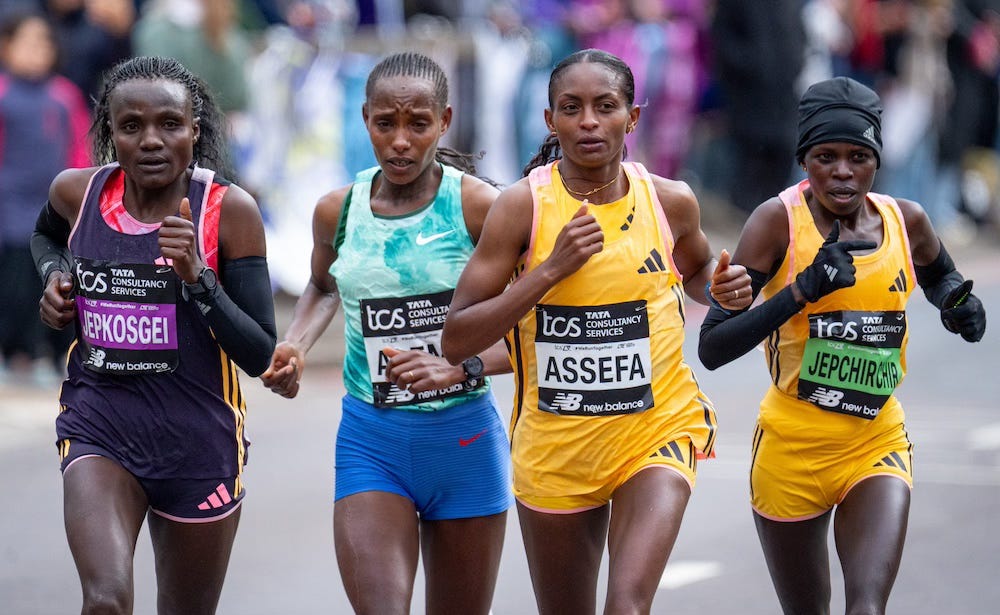
Other London Marathon winners
Catherine Debrunner dominated the wheelchair race, winning in 1:38:54. Switzerland went 1–2 as Manuela Schär took second in 1:45:00, and Tatyana McFadden had a nice race to take third (1:45:51). Six days after winning the Boston Marathon, Great Britain’s Eden Rainbow-Cooper finished sixth in 1:50:39.
For the first time, the wheelchair competitors were awarded the same prize money as the top runners, with Jepchirchir and Debrunner both earning $55,000 for their wins. But the bonuses they can earn are still very different. A course record in the wheelchair race would have been worth $5,000, while Jepchirchir earned $125,000 for breaking the women’s-only world record, plus another $100,000 for breaking 2:17.
The following athletes won their age groups: Lauren Reed (40–44, 2:38:02), Alice Braham (45–49, 2:43:43), Annabel Granger (50–54, 2:48:26, with Karima Harris three seconds back), Alice Riddell-Webster (55–59, 2:58:15), Treena Johnson (60–64, 2:59:06), Sandy Masters (65–69, 3:28:12), Grace Wasielewski (70–74, 3:43:03), Jeannie Rice (75–79, 3:33:27), and Valerie Brown (80+, 5:52:45). Rice bettered her own age-group world record by 65 seconds.
Thanks to Bombas for supporting Fast Women this month
The best-kept secret among runners? Compression Socks. These tighter-fitting socks help prevent aches and pains, so you can bounce back from workouts faster.
I recently got my Bombas Performance Compression Socks, and the arch support, sweat-wicking yarns, and cushioning keep your feet comfortable as you move, and the strong level of support helps you recover afterwards. I also love how they energize my legs during a long day of sitting and writing newsletters.
This gear will also make someone else feel good. For every pair of Bombas you purchase, another pair is donated to someone in need of essential clothing. While I have received products from Bombas, my opinions are solely my own. Use code FASTWOMEN21 to get 21% off at Bombas.com. For new customers only and one use per customer, offer expires 5/6/24.
Gudaf Tsegay sets a high bar early
The Diamond League season started earlier than ever this year, with Saturday’s meet in Xiamen, China. Some athletes looked championship-ready, while others understandably are still shaking off the rust. After finishing second to Elle St. Pierre in the 3,000m at the World Indoor Championships last month, Ethiopia’s Gudaf Tsegay looked like an athlete on a mission. She won the 1500m in an incredible 3:50.30. She moved to third on the all-time list behind only Faith Kipyegon (3:49.11) and Genzebe Dibaba (3:50.07).
Tsegay’s 18-year-old training partner, Birke Haylom, challenged her with a lap to go, but Tsegay had another gear. Haylom took second in 3:53.22, a PR. Ethiopians took seven of the top eight spots, and the top nine women broke 4:00. Four did so for the first time: Australia’s Georgia Griffith (sixth, 3:59.04) and Sarah Billings (ninth, 3:59.59), and Ethiopia’s Habitam Alemu (seventh, 3:59.06) and Saron Berhe (eighth, 3:59.21). Billings took an incredible 7.18 seconds off her PR. Addy Wiley, the lone American in the field, finished 11th in 4:03.45.
Kipyegon was originally scheduled to be in the race as well, but I suppose the running gods decided that was too big a matchup this early in the season. Tsegay would have been tough to beat.
Kenya’s Beatrice Chepkoech also was ready to go. She dominated the steeplechase, winning in 8:55.40. Madie Boreman, the only American in the race, had a solid steeple opener, running 9:34.79 for 11th. (Results)
Taking risks pays off for Harvard’s Victoria Bossong
Harvard University junior Victoria Bossong is one of the best high school sprinters ever from Maine. Competing for Cheverus High School in Portland, Maine, she earned 14 individual state titles in indoor and outdoor track. In her final Class A state meet, in 2021, she won the 100m and 400m. On a whim, she tried the 800m as well, and won in 2:10.66. (She also finished second in the 200m.)
Bossong’s current coach at Harvard, Kebba Tolbert, watched her run that 800m, and he told her it would ultimately be her best event. Bossong was skeptical. But three years later, his prediction is turning out to be accurate. After running 2:04.02 during the indoor season, her performances have really taken off outdoors. In her 800m opener, she ran 2:02.40. And one week later, on March 30, she won a dramatic race against Penn State’s Hayley Kitching at Florida Relays, running 2:00.92, which led the NCAA at the time.
Bossong, 20, is balancing her running with some impressive off-track pursuits. She is studying neuroscience, works in a lab at Harvard Medical School, and in the long term she wants to become a doctor. She also wants to run professionally. “Balancing these ambitions will certainly make for difficult decisions ahead,” she wrote in an email to Fast Women. “But I feel fortunate to have options and be in a position where I can choose a route that aligns with my passions.”
She’s also passionate about gender equity in sports and she founded Harvard’s Voice in Sport (VIS) chapter. This has led to a number of high profile opportunities, including going to Capitol Hill to advocate for the Fair Pay for Women Act, which aims to enhance Title IX, and speaking about the disparity in NIL opportunities for men and women. Last weekend, she interviewed Kara Goucher at an event held in conjunction with the Boston Marathon.
Speedy from the start
Bossong participated in a variety of sports growing up, excelling in soccer, basketball, and softball, especially. Across all of her sports people noticed her speed. Bossong’s first season of track, in middle school, was cut short by an avulsion fracture in her hip. But in high school, she went out for the team again, and it wasn’t long before she was winning almost everything.
It’s not easy being a high school sprinter in Maine. The cold and snowy weather often made training outdoors difficult, and when her team trained indoors, it was in a 90-meter hallway with two turns in the basement of her school. She often had to go out of state to find competitors who could push her. She lost her junior outdoor season and senior indoor season to the pandemic, but she still graduated with the state records in the indoor (55.22) and outdoor (53.81) 400m.
Bossong was the valedictorian of her high school class, and she made a smooth transition to college. On the athletic side of things, it helped that her high school coach adjusted her training her junior year to be in line with what she’d be doing once she got to Harvard. Bossong has won four Ivy League individual titles (500m indoors from 2022–24, 400m outdoors in 2023) and three relay titles (4x400m indoors in 2022 and 2023 and the DMR indoors in 2024) so far.
Harvard’s distance medley relay narrowly missed qualifying for the NCAA Indoor Championships in March in Boston, so Bossong watched the meet from the stands. She was inspired by her teammates Maia Ramsden (mile) and Kenneth Ikeji (weight throw), who won national titles. Seeing the event also reinforced her belief that she belonged out there.
Becoming an 800m runner
Bossong initially feared that moving up to the 800m might lead to her losing some of her speed, but she has gotten faster at every distance. (On Saturday, she lowered her 400m time to 52.16 seconds.) Tolbert says that as Bossong has gotten more experienced, he’s been able to introduce more aerobic training, while still focusing on her speed and power work.
When asked about the longest run she ever does, Bossong defers to Tolbert. “She’s a sprinter who runs the 800, not a miler who runs the 800,” he wrote. “Her long runs are her 45-minute bike sessions, 45-minute swims, 15-minute fartleks after practice on the bike, and 12–15 minute runs on the track.”
Harvard has two of the country’s best 800m runners in Bossong and first-year Sophia Gorriaran. Bossong calls Gorriaran a great friend and says the two have had a blast running on relays together, but they don’t train together. While Tolbert is Bossong’s event coach, Gorriaran is coached by middle-distance and distance coach Alex Gibby. There’s been talk of joining forces in some workouts down the line, though.
Bossong believes that prioritizing recovery has contributed to her success this year. That has meant focusing on getting proper nutrition and adequate sleep and being diligent about doing prehab and rehab exercises.
She has also declared this the year for taking risks. “I’ve gone into races, especially early in the season, willing to fail in order to truly gauge my capabilities, adjust, and experiment,” she wrote. “This mindset has allowed me to explore new strategies and adapt my approach.”
Looking forward, Bossong has big goals. She wants to help Harvard win an Ivy League title this season, she dreams of being the NCAA 800m champion, and she hopes to become an Olympian. Bossong’s mother is originally from the Philippines and she’s in the process of obtaining her Philippine citizenship.
“My family’s history and their sacrifices have profoundly shaped my opportunities and achievements,” she wrote. “They have a legacy of resilience, from serving in World War II to migrating in search of better prospects. This heritage is a cornerstone of my identity and success. It would be an immense honor to represent the Philippines, a way to celebrate and give back to the land that has given my family so much.”
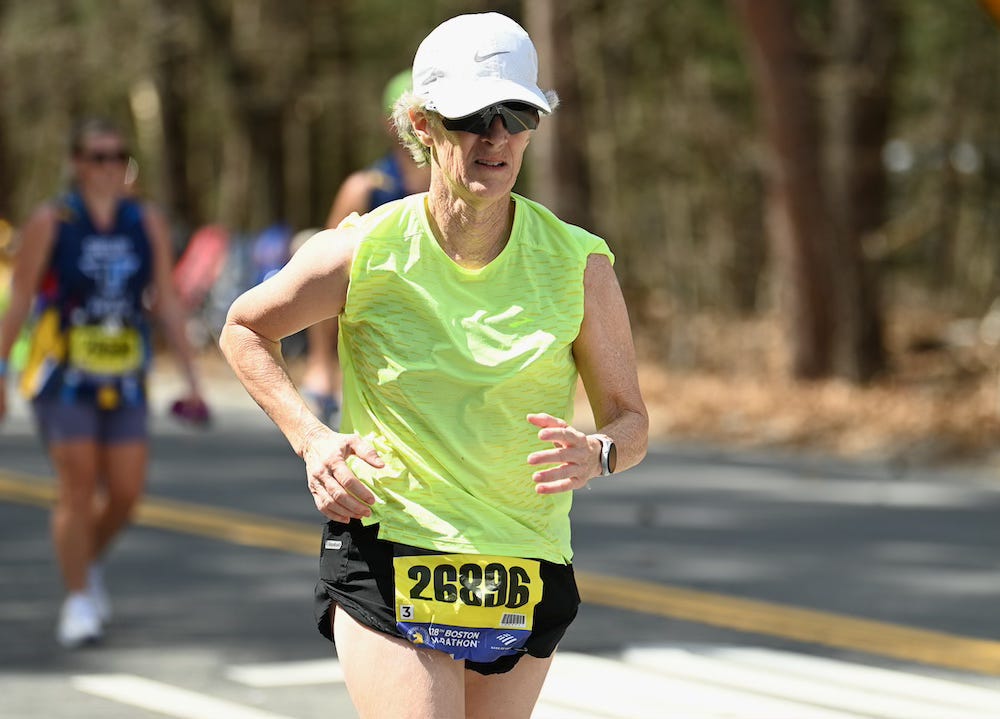
The Boston Marathon isn’t for everyone, but it should be
I’ve been interacting with a lot of Boston Marathoners on Instagram as I post my photos from the race. Most of them are lovely. A small percentage are less so. Some are frustrated that I did not get a photo of them or their loved one, or that I haven’t gotten to posting photos of wave two yet. But when I shared these two posts last week, from Cortney Blackburn and Hector Espinal, some of the responses I received displayed a disappointing amount of elitism.
Both Blackburn and Espinal finished the Boston Marathon, but because they didn’t finish within six hours of the last finisher crossing the starting line, their finishes don’t count. (Blackburn missed by 37 seconds! But she had no idea at the time.) Both were aiming to become World Marathon Majors six-star finishers, and though they have finished all six races, their accomplishments aren’t official.
Boston race organizers did exactly what they said they were going to and stopped recording official finishers at 5:28 p.m. And Blackburn and Espinal are far from being the first athletes to come up against Boston’s cutoff times. But read their stories. It sounds like the cutoffs could have been communicated better. And I understand that the roads can’t stay open forever, but the finish line was still open, and the timing company was still recording athletes’ finishes. I hope that what Blackburn and Espinal have shared will help bring attention to this policy and the race will consider how it can accommodate a wider range of runners, especially those who are aiming to become six-star finishers.
Some people tried to tell me that Boston is different, because it’s for faster runners. Believe me, I’m familiar with the concept of BQing. But the moment the race decided to accept charity runners, invitational runners, streakers, and those going after six-star finishes, it also became a race for people of all speeds. Some of them get to start in earlier waves, so there are official finishers who ran well over six hours. But most people didn’t have that option. There has long been some nastiness targeted toward anyone who gets into Boston without hitting a qualifying time, and for me, that is one of the biggest turn offs about the race.
Wave four is one of the best things about the Boston Marathon. Charity runners raised more than $40 million in Boston last year. And the sport is changing. Elitism is out. I’d like to see Boston do what it can to be a race for everyone who gets a spot on the starting line. Plus blanket cutoff times disproportionately affect women, older people, and people with disabilities.
And speaking of wanting Boston to be for everyone, after the overpolicing at mile 21 last year, Pioneers Run Crew and TrailblazHers moved their cheer station out of Newton, closer to mile 22, this year. It looks like it was the best party on the course, but they never should have had to leave Newton. And if you’re still not convinced of the inconsistent policing along the course, after all the messaging about the importance of a clear route this year, the police in Wellesley still allowed local residents to put a balloon arch on the road again this year. (Here’s a view of last year’s arch.) Yes, they were just hoping to spread joy, but that’s what Pioneers and TrailblazHers were trying to do, too.
Other News and Links
I love this article about Dawn Ebbetts, who won the 70–74 age group at last week’s Boston Marathon in 3:46:02. She didn’t check how she stacked up in her age group until she was on her way home from the race, and she figured there had to be other faster athletes in her age group. And how fun that she’s the mother of 2020 Olympic Marathon Trials qualifier Leigh Anne Sharek.
Lauren Wingenroth wrote a nice piece about Fiona O’Keeffe for Outside Run. Her coach, Amy Cragg, told Wingenroth that she thinks O’Keeffe will win the Boston Marathon someday.
Allyson Felix gave birth to her second child on April 10.
This Wall Street Journal piece was a nice ode to marathon spectators, though I’m sure there are people out there who go to even greater extremes to support their runners on race day.
Just over a year ago, the Athletics Integrity Unit provisionally suspended 2022 world steeplechase champion Norah Jeruto, of Kazakhstan, over abnormalities in her athlete biological passport. (She didn’t test positive for anything, but the changes in her testing over time were suspicious.) But in November, an independent tribunal overturned the suspension. On June 17, the Court of Arbitration for Sport will hear an appeal by World Athletics, who will argue in favor of a ban.
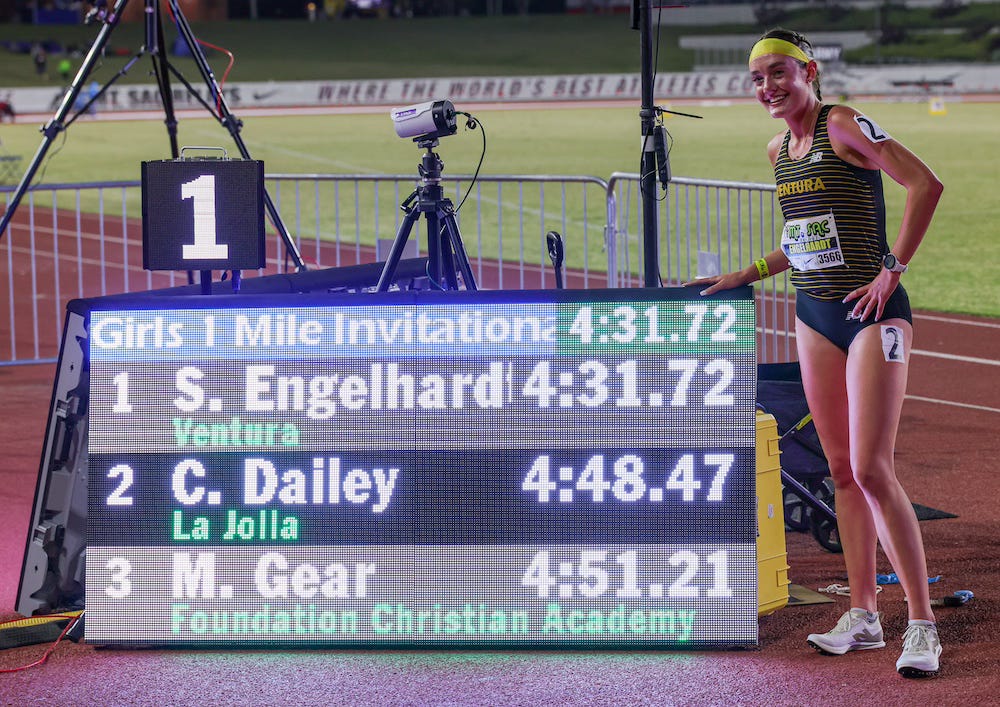
Additional Results
Kenya’s Mary Moraa won the 800m at the Kip Keino Classic in Nairobi, Kenya, in a world-leading 1:57.96. (Results | Race highlights)
Running her first steeplechase in the NCAA, Alabama’s Doris Lemngole made a splash (🤦🏻♀️) winning the Wake Forest Invitational in 9:22.31, which puts her second on the NCAA all-time list, behind only Courtney Wayment’s collegiate record of 9:16.00. Defending NCAA champion Olivia Markezich of Notre Dame took second in 9:36.33. Puma Elite’s Dorcus Ewoi and Angel Piccirillo went 1–2 in the 1500m, in 4:05.79 and 4:05.82, respectively. Harvard’s Maia Ramsden finished fifth in an NCAA-leading 4:07.30. And Rachel McArthur (fourth, 4:07.28), South Carolina’s Judy Kosgei (sixth, 4:07.65), and Virginia’s Lindsey Butler (seventh, 4:07.96) were among those who ran big PRs. Atlanta Track Club Elite’s Sadi Henderson won the 800m (2:00.87) and UNC’s Makayla Paige took second in 2:00.97, a PR. Columbia’s Phoebe Anderson won the 5,000m (15:29.02). (Results)
At Oregon Relays, Raevyn Rogers won the 800m in 2:02.00 (800m results). Karissa Schweizer won the 1500m in 4:08.66, and Maddy Berkson took second in 4:09.60, a PR. (1500m results)
At the Virginia Challenge, Rider’s Teagan Schein-Becker won the 800m in 2:02.28, a PR. (Results)
California high school junior Sadie Engelhardt set a U.S. high school mile record of 4:31.72 at the Mt. SAC Relays, taking 2.15 seconds off the record previously held by Katelyn Tuohy. The most impressive part is that Engelhardt led the race wire to wire and won by more than 16 seconds. Mary Cain has run faster indoors (4:28.25), but she was in a pro race. And Addy Wiley ran 4:26.16 for 1600m, but she was paced by Lauren Johnson. Sammy Watson won the 800m in 2:02.25. (Results)
Laura Muir won the Podium 5K in Dulwich, England, in 15:19. According to Athletics Weekly, she hadn’t run a road 5K since 2011, so she took 3:01 off of her PR.
Podcast Highlights
Mary Ngugi-Cooper discussed the work she does to fight gender-based violence in Kenya on the Citius Mag podcast. She said that sharing a stage with Emily Sisson, Sara Hall, and Emma Bates has made her aspire to have the same level of confidence and respect that they do, and spread that to girls in Kenya as well. I’d say it’s going pretty well for her. She also discussed the importance of Kenyan men being involved in the fight against gender-based violence. As far as I can tell, the Kenyan male pro runners have been very quiet on the subject so far.
On The Running Effect, Vanessa Fraser had some good things to say about how to keep going after big goals in the sport, even when PRs become harder to come by. And it was interesting to hear that she negotiated her own contract both when she first went pro and recently, when she signed with Saucony.
Emily Infeld (and her husband, Max Randolph) discussed some of the same issues on What’s Inside the Box? And I could relate when she said she doesn’t truly understand how the world rankings and Olympic qualifying works in the 10,000m.
Emma Bates discussed her 12th-place finish at the Boston Marathon on the Citius Mag podcast. My head exploded a little when she said her four hours of biking per day while injured wasn’t so bad, because Emma Coburn, her teammate, was doing five-hour days.
Additional Episodes: Emma Bates and Jenny Simpson’s live episode of the Ali on the Run Show, in advance of the Boston Marathon | Dom Scott on Hurdle, pre Boston | Australia’s Jess Stenson discussed running a 2:24:01 marathon six months after having her second child on the Inside Running Podcast | 2:40 marathoner Maura Lemon had some good insights on The Running Public | Katie Arnold discussed self advocacy in the healing process, among other things, on Women’s Running Stories | Ali Ince on The Running Effect | Sika Henry talked more about her Selma to Montgomery FKT on C Tolle Run
Thanks, again, to Bombas for their support this month and to all of you who support Fast Women via Patreon and Venmo. I hope you have an excellent week.
Alison
Subscribe to Fast Women
The latest in women's competitive distance running.






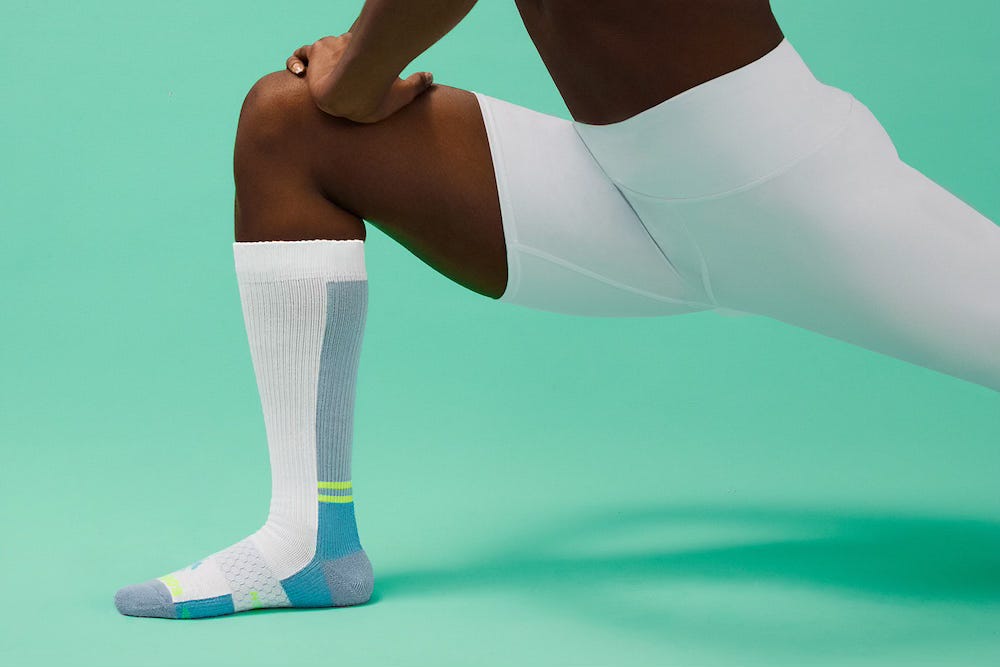
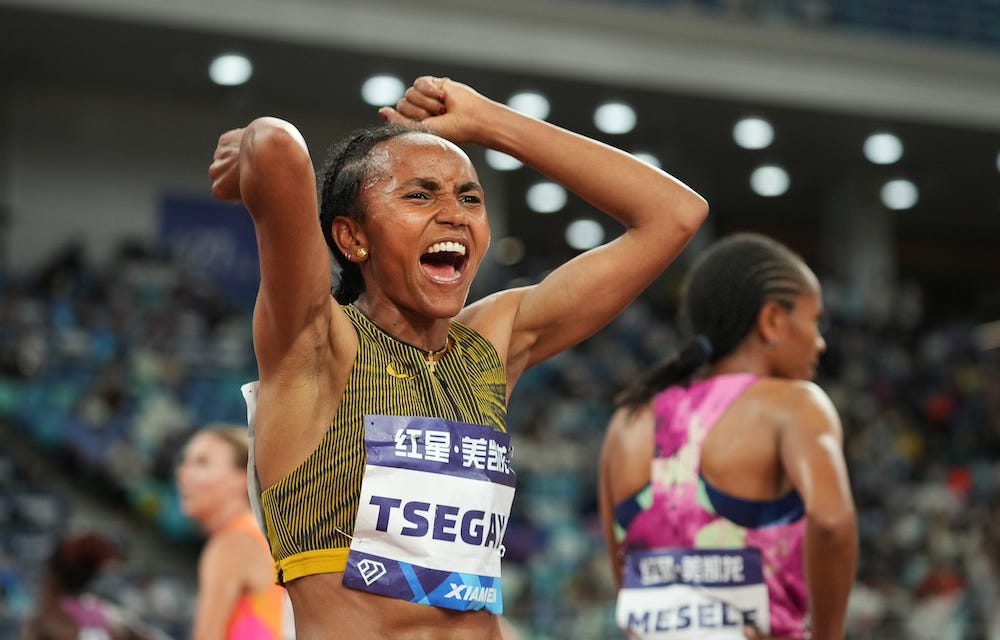
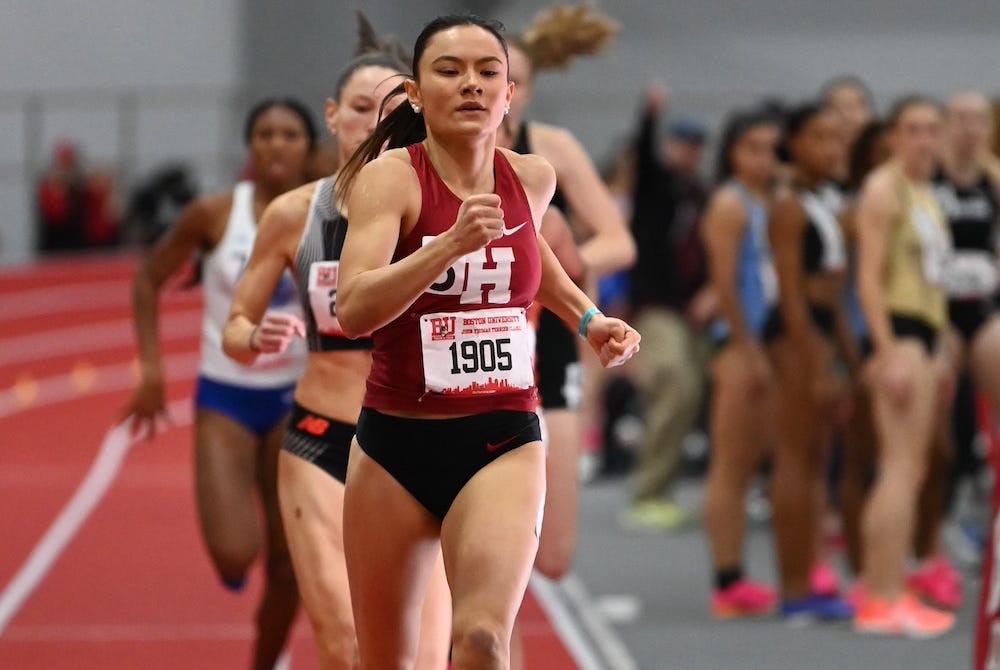





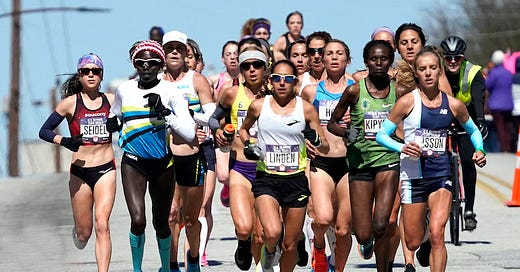

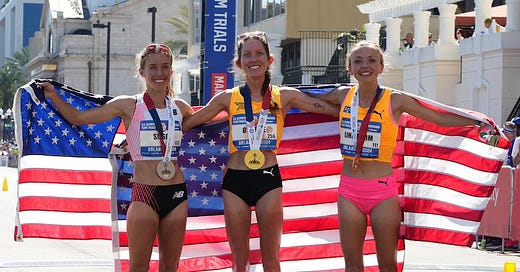

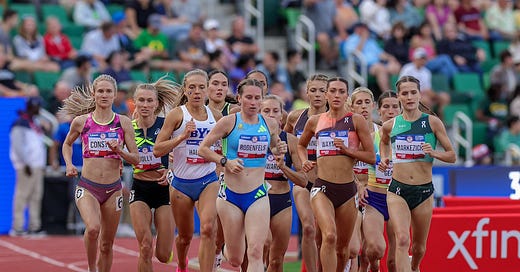

Stunning that Victoria Bossong couples athletic success with academic success! Wow! Thanks for that story.
Peres Jepchirchir’s finish was amazing! I watched the replay of the last few minutes. The Olympic marathon will be a great race. Also, its an interesting idea to have a women’s only world record and a women’s world record (where men can help as pacemakers)… I would be interested in hearing more thoughts on this from the athletes themselves.